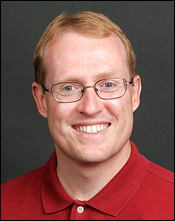This column by Douglas C. Schmidt, professor of computer science, and Philippe Fauchet, dean of the School of Engineering, appeared in the Tennessean Aug. 6, 2013.
Nashville is becoming known as much for its entrepreneurial and innovation endeavors as for its music. Catch the creative vibe from a quick tour of the downtown space that’s home to the Nashville Entrepreneur Center (NEC) or the news that the Mayor now has two Chief Innovation Officers.

But how do we go from the visionary stage to becoming a city that’s a natural fit for high-tech companies with a highly qualified work force? The places throughout the country with abundant high-tech talent all have close ties with local world-class universities. Universities play a critical role by producing talented students who are the trained labor force required by high tech companies. The challenge is to create an environment that motivates bright, creative people with specialized skills to work here.
One approach is to convince the best and brightest from elsewhere to relocate in Nashville. While this approach has merit, it’s expensive and takes time to build critical mass. We are pursuing a more effective approach: convincing bright students at Vanderbilt to remain in Nashville after graduation. The Vanderbilt University School of Engineering (VUSE) is already showing progress in this direction since we produce more graduates who stay in Tennessee than we admit from the state. We’d like to convince even more to stay.
One way to meet that goal is to enrich the high-tech ecosystem by helping launch start-up companies in the area and getting our students involved with these startups. Making this process work requires motivated students, faculty, and entrepreneurs. Within the School of Engineering, the Institute for Software Integrated Systems (ISIS) has a long history of cross-fertilizing people, ideas, and technologies in the region. For example, one of ISIS and VUSE’s faculty members, Jules White, has launched an innovative augmented reality platform that uses mobile phones to capture and analyze data in real-time. Another startup focuses on securing mobile devices that have sensitive corporate or government information on them. All are staffed 100 percent by VUSE graduates.

VUSE is now institutionalizing its commitment to foster more of these innovative startups. For example, we have created a Technology Entrepreneurship Task Force to identify partnership opportunities between students, faculty, and entrepreneurs. VUSE students have formed a student-driven organization called the Vanderbilt Innovation and Entrepreneurship Society (VINES) to promote a startup ecosystem on campus. The VUSE curriculum is focusing on principles, patterns, and techniques in key areas, such as mobile software, cloud computing, information security, and digital learning, needed to educate tomorrow’s entrepreneurs. VUSE is also teaming with Vanderbilt’s Center for Technology Transfer and Commercialization to place new student-led ventures in dedicated Vanderbilt space at the NEC.
The key to sustained success and smart growth in high technology is quality education, from kindergarten through the undergraduate and graduate years. VUSE is working hard to attract the best and brightest students, create opportunities for them, and encourage the right people to stay here for the right reasons. We look forward to collaborating with Nashville entrepreneurs and innovators to continue growing the region’s high-tech talent pool.